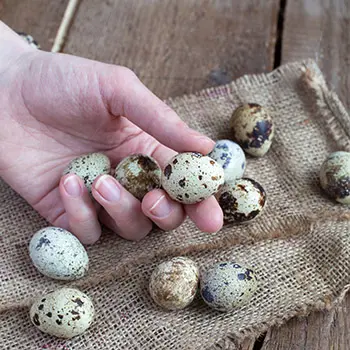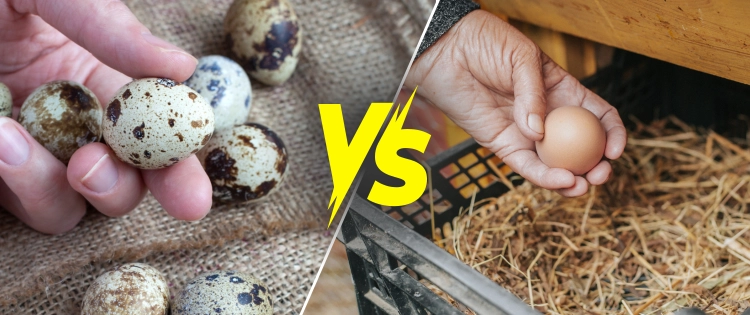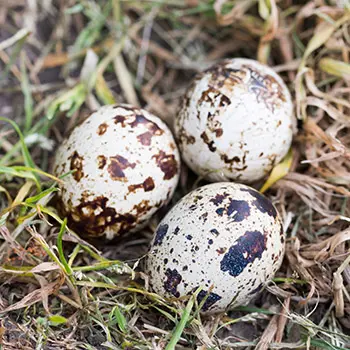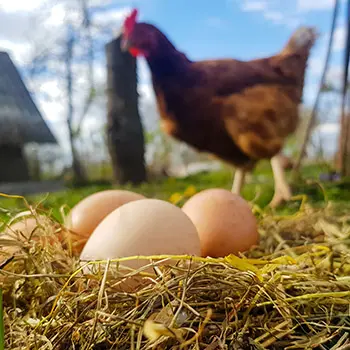One of the many dilemmas homesteaders face is the type of livestock to raise on their land. Something that often comes into question is whether to produce quail or chicken eggs.
They both have their unique benefits, but they also have their disadvantages. Therefore, it is important to have the right information on hand so that you can make an informed decision to help you achieve your homesteading goals. With that said, here is everything you need to know about quail and chicken eggs.
Quail Eggs
Although extremely delicious, quail eggs are not as popular as chicken eggs. There are several reasons for this including consumer habits, production challenges, market dynamics, and logistical considerations. Nevertheless, these small, speckled eggs are slowly becoming a culinary tradition in many cultures. Here are some of the advantages and disadvantages of quail eggs.
Advantages
There are several advantages associated with raising quails for the purpose of producing quail eggs, here are some of the most common:
Quails are a lot smaller than chickens and don’t need as much space as them. This makes quails ideal for homesteaders with limited land. You can raise quail in smaller coops or even in cages inside a barn or a shed.
Related: How To Raise Quail And Why You Should Do It
Quails start laying eggs early, typically between four to six weeks old. Therefore, even with a small flock, you will have a consistent and abundant supply of eggs.
If you want to limit noise production, quails are your best bet because they are nowhere near as loud as chickens. This is definitely something you will need to consider if you prefer a more peaceful homestead environment, or if you are close to your neighbors and you want to be more considerate towards them.
For homesteaders looking to make a profit from selling eggs, quails will make you more money because they are considered a delicacy and so are sold at a higher price.
Disadvantages
There are plenty of advantages to raising quails for the purpose of producing quail eggs, but there are also some disadvantages. Here are some that you might want to consider:
Quail eggs are tiny in comparison to chicken eggs. You will need around 3-4 quail eggs to match the size of one chicken egg. If you plan on using eggs to cook and you want volume, quail eggs are not your best option.
Quail eggs are extremely delicate and they break a lot easier. This can become a problem during collection, transportation, and storage.
While quails are strong birds, they do have specific care requirements which can make them harder to raise than chickens. For example, they need a secure, enclosed space to prevent escape, and their smaller size makes them more susceptible to stress and injury.
While there is definitely a market for quail eggs, it is very niche. You won’t see quail eggs advertised in the same way as chicken eggs. If you are planning on selling quail eggs, you will need to put a lot of effort into educating consumers about their benefits.
Chicken Eggs
Chicken eggs, laid by hens, are one of the most commonly consumed types of eggs worldwide. They are a nutritious and versatile food staple, essential to various culinary traditions. Here is a deeper look at the advantages and disadvantages of chicken eggs.
Advantages
There are several advantages associated with raising chickens for the purpose of producing chicken eggs, here are some of the most common:
Chicken eggs are a lot bigger than quail eggs, adding additional versatility for culinary uses. Whether you’re frying, baking, or scrambling, chicken eggs are the standard in most recipes making them a convenient choice for both home consumption and market sales.
If you are just about to start raising chickens, they are beginner-friendly. Chickens are resilient and can adapt to any environment which means you won’t need to worry about things like climate change and conditions you can’t control. Also, there are specific chicken breeds available for egg production, ensuring a consistent supply of eggs throughout the year.
Related: Never Feed THIS to Your Chickens
If you plan on selling your chicken eggs, you won’t have any difficulties doing so because there is already a large established market for them. You won’t need to do much work to educate potential buyers about your product, and you will have a consistent demand for eggs.
Disadvantages
There are plenty of advantages to raising chickens for the purpose of producing chicken eggs, but there are also some disadvantages. Here are some that you might want to consider:
Chickens need a lot more space than quails. They need plenty of room to move around and forage. This is something you will need to consider if you have a smaller plot of land.
If you don’t like a lot of noise and cleaning, you might want to opt out of raising chickens. They crow and cluck which will disturb you and your neighbors if you have any living in close proximity to you. Also, chicken coops need regular cleaning to prevent health issues and unpleasant smells.
Chickens are a favorite for a lot of predators including foxes, hawks, and raccoons. You will need an additional budget to protect your chickens with secure fencing and housing.
Nutritional Considerations
Both quail and chicken eggs provide excellent nutritional value. However, they do have different nutritional profiles:
| Nutrient/Characteristic | Chicken Eggs | Quail Eggs |
|---|---|---|
| Iron | Lower concentration per gram | Higher concentration per gram |
| Vitamin B12 | Lower concentration per gram | Higher concentration per gram |
| Riboflavin | Lower concentration per gram | Higher concentration per gram |
| Protein | Less protein per gram | More protein per gram |
| Yolk-to-White Ratio | Lower ratio, less cholesterol and fats | Higher ratio, more cholesterol and fats |
| Choline | More choline (essential for liver and brain health) | Less choline |
| Sodium | Lower natural sodium | Higher natural sodium |
| Vitamin D | More vitamin D | Less vitamin D |
Whether you decide on quail or chicken eggs depends on the goals and specific circumstances you have as a homesteader. As you’ve read, both eggs provide unique benefits and will be a valuable addition to your homestead. Which one is best for you? Let us know!
If You See These Eggs In Your Backyard, Burn Them Immediately! (Video)












